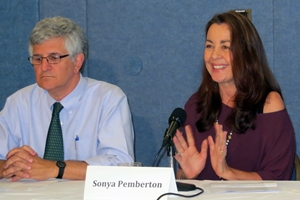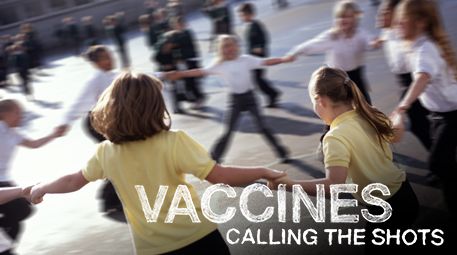4 September 2014. Public Broadcasting Service (PBS) will air a documentary next week on the changing public attitudes toward vaccines and their effects on the growing occurrence of communicable diseases in the U.S. The show, Vaccines — Calling the Shots premieres on PBS as part of the NOVA series of science documentaries on Wednesday 10 September.
At a briefing today for media in Washington, D.C., the show’s producer-director and some of the experts appearing in the film described the degree of public resistance to vaccinations for children, which appears to be bringing back more cases of diseases once thought eradicated. Centers for Disease Control and Prevention reports as of the end of August 2014 nearly 600 cases of measles in the U.S., for example, the largest number in 20 years. Also as of August, the state of California declared a pertussis or whooping cough epidemic, with more than 7,500 cases reported so far in the state this year. Refused or delayed vaccinations are considered a prime cause of both outbreaks.
Paul Offit, director of vaccine education at Children’s Hospital in Philadelphia, outlined the idea of community or herd immunity, a situation where nearly all people in a community are vaccinated against a disease, which sharply reduces chances for that disease to spread, and the keeps the disease contained. However, once the rate of vaccination drops below 95 percent, said Offit, herd immunity begins to break down for diseases like measles.
One of the reasons for growing resistance to vaccinations, Offit noted, is the lack of awareness of the suffering these diseases can cause. Before development of the measles vaccine in 1963, measles was familiar and feared, causing 38,000 hospitalizations and 500 deaths a year. Offit told about dealing personally with a measles outbreak in Philadelphia in 1991, causing 1,400 cases and 9 deaths. “The city was in a panic,” he added.
Sonya Pemberton — a film maker, science journalist, and the show’s producer, director, and lead writer — noted the small numbers of people who are adamantly opposed to vaccinating their children, about 1 percent, but still have an influence on many more who have questions about vaccine safety. Pemberton estimates those opposed or questioning vaccinations comprise about 10 percent of the population, a relatively small percentage, but enough to break herd immunity.
Pemberton recommended speaking to parents with questions or concerns about vaccines “respectfully and acknowledging people are not necessarily outright refusing, but are concerned.” People with concerns about vaccines will get all kinds of information over the Internet, and you need to deal with those fears with sensible and impartial information based on science. “It is okay to talk concerns and fear,” said Pemberton, noting that “acknowledging fear helps people deal with fear.”
Brian Zikmund-Fisher, a psychologist and professor of public health at University of Michigan, studies perceptions of risk associated with vaccines. He noted that vaccines are among the safest of medicines made, yet on a personal level, it is often difficult to sell parents — the vast majority of whom never experienced the diseases — of the benefits of a vaccine, as long as there are fears about safety. Zikmund-Fisher said discussing statistical probabilities, no matter how small, does not work, adding “parents care about possibility not probability.”
Joe Lawlor, a health reporter for the Portland Press Herald in Maine, wrote a series about vaccines in Maine that suffered a pertussis outbreak in 2012.He said the series got some 600 comments, about 10 times the usual number.
Maine, like most states, allows parents to opt out of vaccines for religious or philosophical reasons, and nearly 4 percent of parents exempt their children from vaccinations. Some of the resistance is political, Lawlor said, where some people object to government telling parents what to do. Nonetheless, Washington State tightened their exemption requirements, which resulted in fewer disease outbreaks in that state.
In response to a question from Science and Enterprise, Offit said pediatricians do a better job at explaining the rationale behind vaccines for children than family practitioners convincing adults to get vaccinated for the flu or shingles. While family practitioners are doing better, he still called vaccination rates among adults “woeful.”
Zikmund-Fisher added people tend to be more protective of children than themselves. “Children are people that are looked upon as needing special protection,” said Zikmund-Fisher, “and that makes the conversation more difficult when the tradeoff between benefits and risks comes to the surface.”
Read more:
- Early Trial Shows Parkinson’s Vaccine Creates Antibodies
- Pfizer Acquires Baxter Vaccines Business
- Dengue Vaccine Shown to Cut Infections, Hospitalizations
- Health Quality Agency: Vaccines Safe, Adverse Effects Rare
- Biopharm, University Partner on Universal Flu Vaccine
* * *



 RSS - Posts
RSS - Posts
You must be logged in to post a comment.